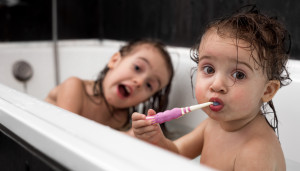 If you’re a parent of school-aged children, you’ll know what a challenge it is to keep your kids healthy and safeguarded from other children’s colds. But did you know that more than 51 million school hours are lost every year because of a dental-related illness? This amazing fact highlights the importance of early dental care for healthy young lives and strong school attendance.
If you’re a parent of school-aged children, you’ll know what a challenge it is to keep your kids healthy and safeguarded from other children’s colds. But did you know that more than 51 million school hours are lost every year because of a dental-related illness? This amazing fact highlights the importance of early dental care for healthy young lives and strong school attendance.
It is recommended by the American Academy of Pediatric Dentistry that parents should be taking children for their first visit to the dentist six months after their first baby tooth pops out. For most children, that’s about age 1. At that initial appointment, parents will receive valuable information about early dental hygiene.
Healthy Teeth for Babies
The American Dental Association discusses guidelines for early dental care. This should begin just a few days after birth! Start by wiping a baby’s gums with a moist piece of gauze or a gentle baby’s washcloth. When teeth start to appear, you can begin brushing with a very small amount of toothpaste and a toothbrush specially designed for babies. Be aware of the potential danger of what is known as “baby bottle tooth decay.” This can occur if you get into the habit of putting your child to bed with a bottle that contains juice or some other substance that contains sugar. If they need a bottle to go to bed with, make sure that it only contains clear water.
Children’s Dental Concerns
Sugar is a key concern for children of all ages, and it might come from unexpected sources. While we’re all well-aware of the dental dangers of soda and candy, lots of kids, especially preschoolers, may be drinking juices that have “hidden sugars.” According to the American Academy of Pediatrics, the greatest dental concern among preschoolers is tooth decay.
It’s crucial to start children off with good dental hygiene, and this will often mean assisting them with brushing, possibly until age 7 or even older, depending on their ability to properly brush on their own. A good brushing technique requires some sophisticated coordination that some younger kids just don’t have yet. And that’s even more the case when it comes to flossing!
Good Dental Habits Begin When You’re Young
Some people may think that because baby teeth naturally fall out anyway, that they aren’t all that important. But that isn’t true. Baby tooth molars, which stay put until a child is 10 to 13 years of age, are needed for proper chewing. They also act as placeholders for permanent teeth. This means that the condition of those baby teeth dictates the way in which your permanent teeth come in and then fit together as an adult.
It’s a startling statistic, but nearly half of children across the U.S. (more than 40 percent) have cavities by kindergarten age. If you, as a parent, can help them to brush their teeth every day and limit their intake of sugar, this might be avoided. You should also start them on their bi-annual dentist visits when they’re still toddlers, for a lifetime of happy, healthy smiles.







Leave a Reply